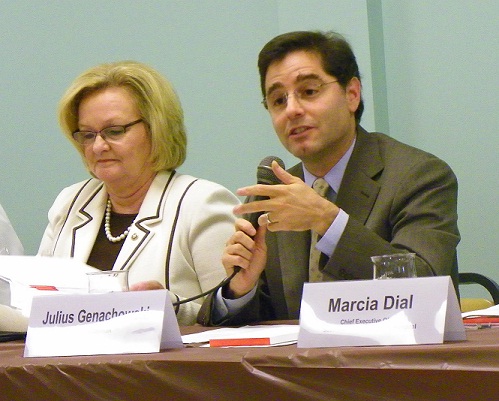Federal Communications Commission To Update Media Marketplace Rules
WASHINGTON, March 4, 2011 — The Federal Communications Commission on Thursday moved to tweak the rules governing the terms on which cable companies and satellite operators can re-transmit the signals of broadcasters in the wake of several high-profile disputes that often left consumers in the dark a

“It’s time to take a fresh look and explore whether there are measures we can take to allow the market-based process contemplated by the retransmission consent laws to operate more smoothly, and serve consumers and the marketplace,” says FCC Chairman Julius Genachowski PHOTO: V. Proffer
WASHINGTON, March 4, 2011 — The Federal Communications Commission on Thursday moved to update the rules governing the terms on which cable companies and satellite operators can re-transmit the signals of broadcasters in the wake of several high-profile disputes that often left consumers in the dark at critical programming moments.
“Retransmission consent negotiations have become more contentious recently, and consumers have gotten caught in the middle,” said FCC Chairman Julius Genachowski in a statement issued Thursday.
“Last fall, millions of cable subscribers lost access to baseball playoff and World Series games, and many other viewers have been blindsided by less publicized disputes,” he noted.
“It’s time to take a fresh look and explore whether there are measures we can take to allow the market-based process contemplated by the retransmission consent laws to operate more smoothly, and serve consumers and the marketplace.”
The commission decided to examine several proposals that it hopes will better protect consumers during the retransmission consent negotiation process between the various media and telecommunications companies, but it declined a request to get directly involved in the negotiation process from a large coalition of cable and satellite companies, and public interest groups.
Specifically, the commissioners declined to arbitrate disputes when they break down and come to an impasse, and they rebuffed the idea of ordering continued carriage of the broadcasters’ signals during such impasses.
They said they don’t have the authority to do those things.
Instead, the commissioners want to examine how the mechanics of the marketplace can be improved in light of the radical changes in the modern media marketplace.
They’re interested in the idea of eliminating the commission’s network non-duplication and syndicated exclusivity rules. That would mean that broadcasters would have to enforce their contractual rights through litigation in the courts, rather than through the commission.
The commission is also interested in rules that would require more notice to consumers about possible disruptions during negotiation impasses, and providing more detailed guidance to players in the marketplace about what the “good-faith negotiation” requirements are.
Consumers lately have often gotten plenty of notice about disruptions to their service as companies on both sides publish YouTube videos and web sites blaming each other for being unreasonable during business negotiations.
Retransmission consent fees are a form of compensation either in cash — or some other non-cash deal — that video distributors pay for broadcasters’ programming.
Last year, a coalition of 14 entities that include the American Cable Association, Cablevision, Charter Communications, DIRECTV, Dish Network, Public Knowledge, The New America Foundation, Time Warner Cable, and Verizon petitioned the FCC to change the rules, which were first brought into being by the 1992 Cable Act.
The group wanted the FCC to allow distributors to carry the broadcasters’ signals on an interim basis during negotiations, even if contracts have expired.
They also wanted the FCC to step in to arbitrate if two negotiating parties failed to arrive at a new agreement, which is re-negotiated every three years.
The petitioners argued that these steps would prevent the showdowns that can lead to service interruptions for consumers at critical television viewing moments, such as the Oscars and during sporting events.
Most of the parties that had become involved in the process applauded the commission’s proposals on Thursday.
“NAB is pleased the FCC correctly concluded that the marketplace is best equipped to negotiate private business contracts, and that it lacks authority to impose the heavy-handed government tools that pay-TV providers desire,” said Gordon Smith, the National Association of Broadcasters’ president and CEO in a statement.
“In more than 99 out of 100 retransmission consent negotiations, agreements are concluded successfully and invisibly. Broadcasters will continue working earnestly to ensure that consumers receive no TV service disruptions, mindful that even the threat of injecting government into a market-based process only incentivizes pay TV providers to game the process.”
New York-based Cablevision responded to the FCC’s Thursday decision by saying that it wants the commission to enact more specific rules governing the terms of negotiations between video distributors and broadcasters.
Public Knowledge, one of the public interest groups that had petitioned the FCC to change the rules last year, disagreed with the commission’s Thursday decision.
“We hope that at some point the Commission will come to realize it has the statutory authority to relieve the consumer distress at being caught in the middle of the disputes, said Harold Feld, the group’s legal director. “We will make that point again to the Commission, and hope it will take a more active role than it has in the past in bringing some order to the retransmission chaos.”
For a detailed discussion about the retransmission consent debate, and to see what ideas have been floated in the policy community about how the law might change, check out theIntellectual Property Breakfast Club’s June discussion panel on the subject.









Member discussion